It's been a long time, a lot has happened, and it's been a lot of fun. My thesis draft is done, and I have my classes under control, so I can finally blog a long entry. After Christmas in Colorado, I took a trip with Sloan to Dubai, and then detoured from Pakistan to Egypt. We ended up mixing company with several Wharton and Berkely B-school students as well. Good times.
Dubai

Dubai is one amazing city. It's one of seven Emirates in the UAE (United Arab Emirates). Dubai is the 2nd wealthiest Emirate (behind Abu Dhabi), with only about 15% of its revenue coming from oil. If I were interested in a global career, I would be doing everything I can to get lined into this city. Explosive growth, being strategically orchestrated to succeed on a large scale. Had I not seen it, business by business, I wouldn't believe it. If I weren't already into commercial manned spaceflight, I'd be gunning to get help build this city into what they have planned. Huge endeavor.

(Christmas Tree in the Emirates Palace Hotel, Abu Dhabi, UAE)
The first thing that struck me getting off the airplane, and repeated throughout shopping areas and hotels, is the commercial celebration of Christmas. They had a Christmas tree in the airport, and had Christmas trees all over. They didn't hassle with politically correct "Happy [stinking] Holidays." They let Christmas stand as it is and always has been. Clearly, Dubai is one of the most cosmopolitan of the Arab cities.
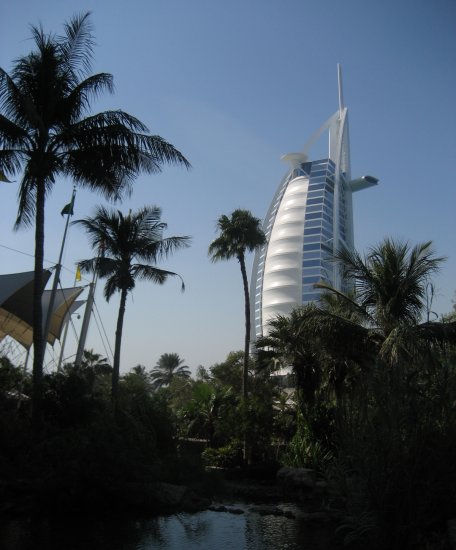
I love the aesthetics of this picture. Apparently, this is the most expensive hotel in the world.
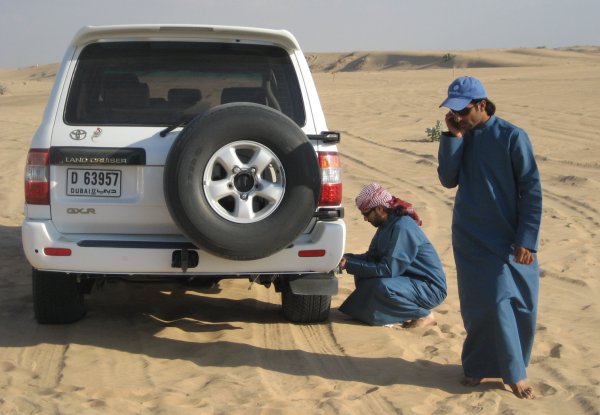
We had a blast all the way through. For starters, we booked six or so Land Cruisers and drivers to go dune bashing through the sand. I've done a little risky driving in my time, but these guys are amazing and have a blast with these things.
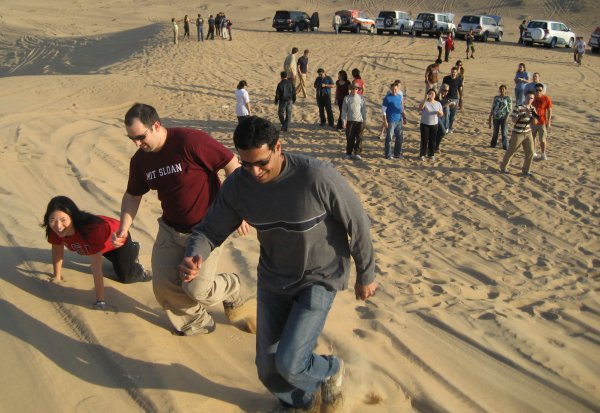
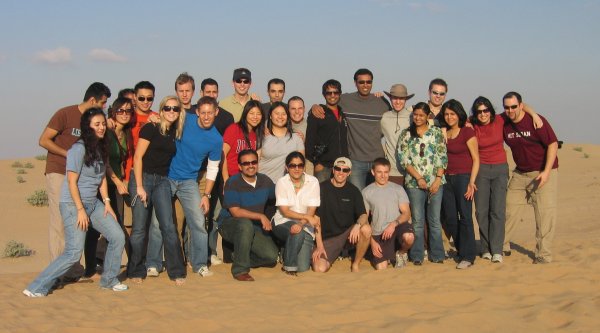
We had a good time in the dunes, and finished the day jamming out in this little oasis place with good food and music.
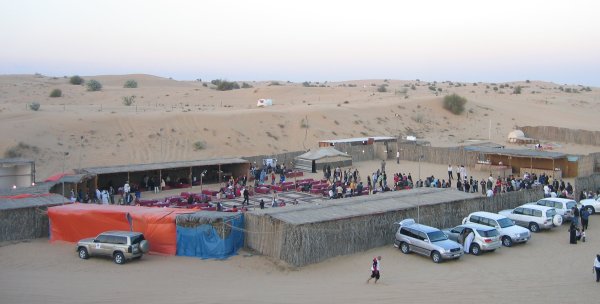
Then we spent the next few days seeing the city, what's been built, what they're building, and visiting several of the companies making up the economic substance that this city will run on.
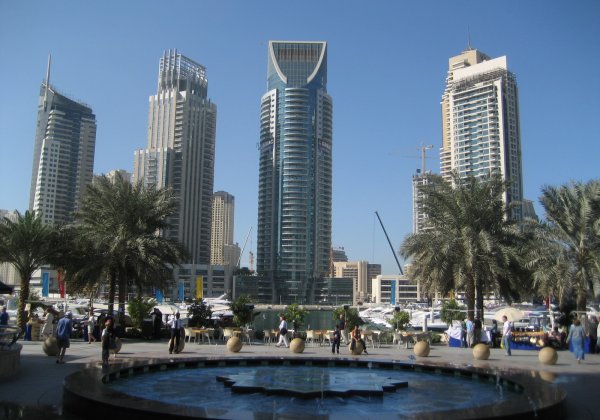
It's amazing how fast this place is growing, and how much construction is going on. I love seeing a skyline forested with cranes, and Dubai had these everywhere.
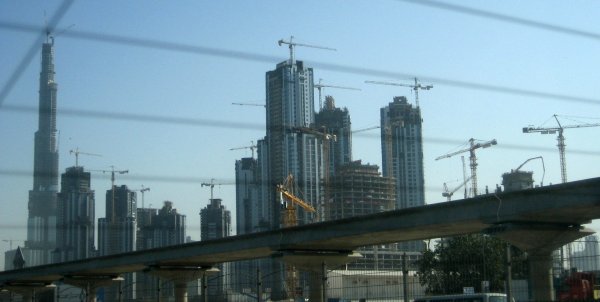
The building to the left is actually far in the distance, and will be the tallest building in the world when it's finished. So that's a bit of what' being built now, but they have a clear strategic vision they've been pursuiing for the past decade to make this place economically self sustaining.
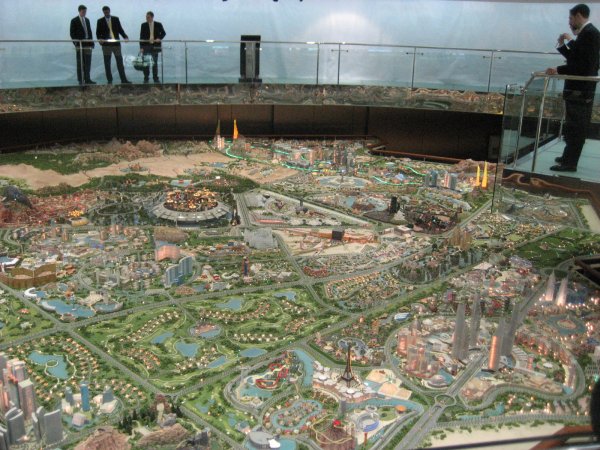
This model here is part of the Dubai Land vision, far larger than Las Vegas, making Disney's Epcot Center look like a small playground. This is just the tourist aspect. They're putting equal effort into building up the financial sector, actracting major corporations (like Haliburton) to relocate their headquarters here, and other knowledge based and services industries.

One significanly amazing aspect is the fact that all the investment coming into this place is coming from external investors, with only a minority from oil based investors (mostly Western Europe, with a good portion from Japan and China).
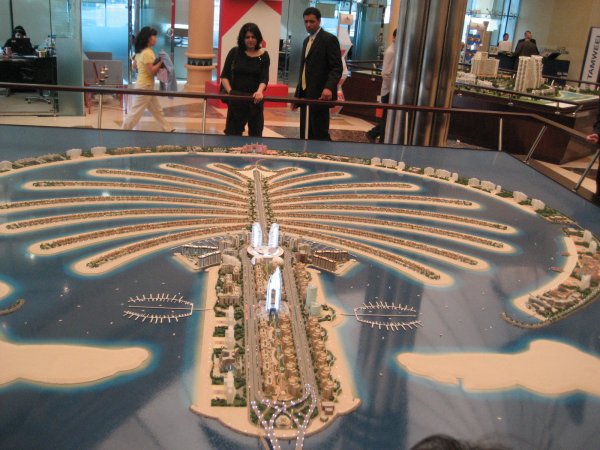
Of course, the Palm shaped Islands they've built and are building are pretty cool...
(satellite picture from 2006... 2 years ago!)
... Including the islands making up the map of the world.
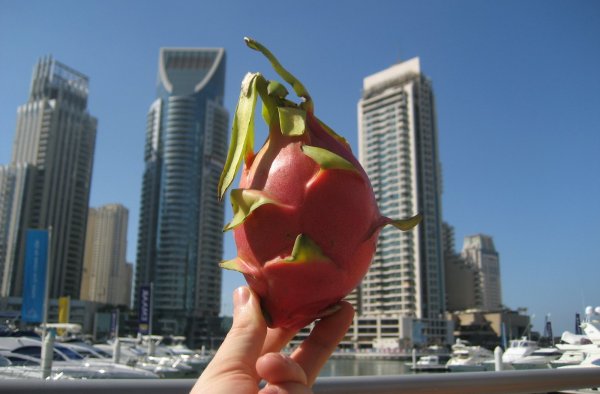
We did the regular tourist stuff as well, and that was fun, although I have to be honest; this trip wouldn't have been near as interesting without visiting the companies, the Dubai development group, and seeing the internal forces that are buiding this city in the desert out from nothing.

(Dragon Fruit)
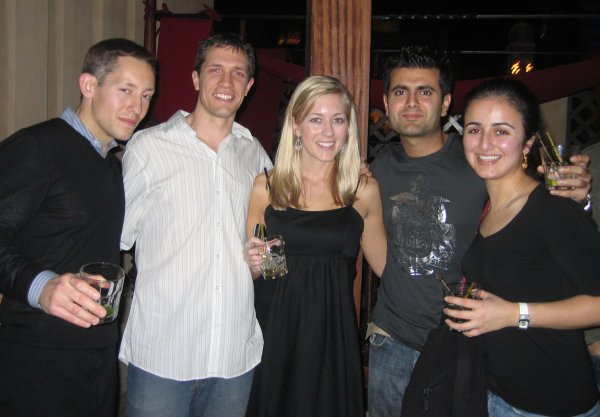
Typical night life.
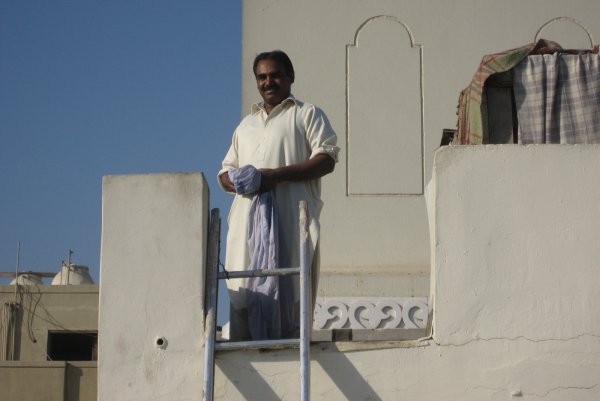
Exploring into corners of the market, and onto the rooftops, we ran into this guy living up on top. long
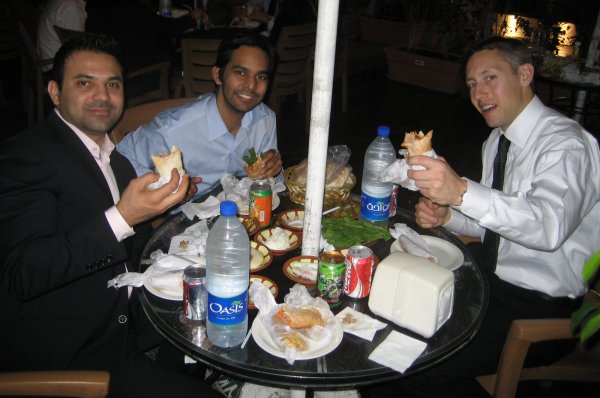
I shall forever now be a schawarma snob. The stuff in Boston and California is good, but the schwarama here is a whole new level.
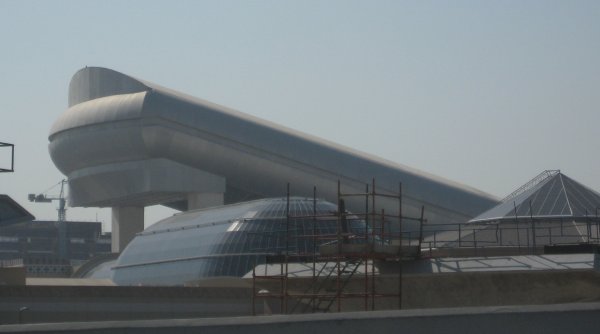
I'm still kicking myself about not getting to ski in Dubai's monstrosity of an indoor ski slope. Unintentionally, I took another bus ride to Abu Dhabi instead, which turned out to be more worthwhile in the long run because of conversations I had on the way there and back, in addition to our visit with several investment groups.
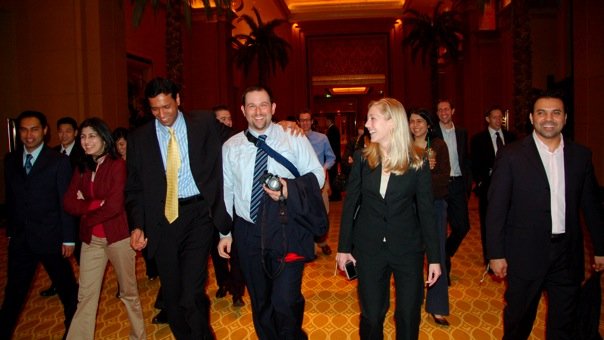
One of these groups, Mudalla (?), is a shining example of successful foreign relations policy. They started as an "Offset" investment group for military expenditures. For every dollar the UAE spent on military equipment from the US (F-16's, satellite services, etc), we required that they invest a dollar in developing business independent of oil. Ten years later, this offset group was doing so well, they spun off an independent group to continue the business development, and they've likewise done very well.
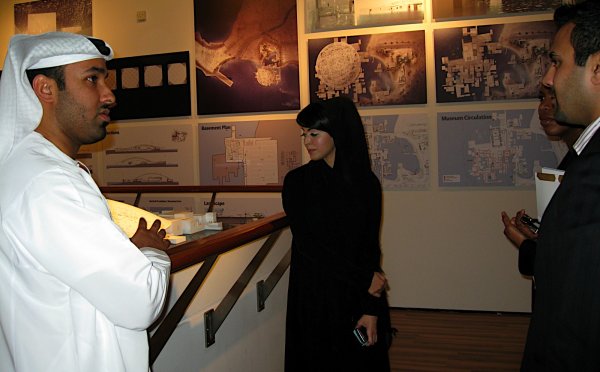
Talking with these guys dressed in their white sheets and head scarves was a very uplifting experience. "Perfect Courtesy" really seems to sum up the feeling of our interactions. It's ironic, but this manner of dress which is so vividly in perfect fulfillment of religious conformity, has the effect of entirely removing religion, formality, nationality, and every other possible division from the conversation. It's almost as though with them wearing such a vividly defined manner of dress, and treating us with such perfect courtesy, that it lifts our association above any human divisions, and we can interact with each other as mutually respecting human beings. I didn't have any long conversations with the women in the group, but they were in the flawless black hijab with only their face exposed, and it seemed to have the same effect.
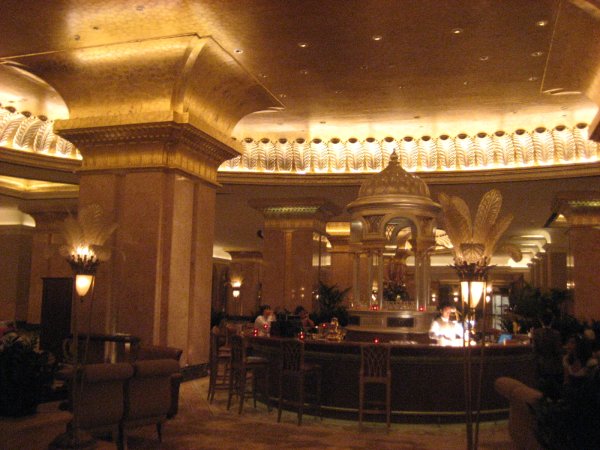
An unexpected observation from the trip. In Dubai, women seem to have every equality they ask for. One of our appointments was with several high level founding members of the Noor Bank (article about our visit), recently launched and serving as an Islamic Bank. That was interesting in terms of how they work as an Islamic Bank, but I asked the Deputy CEO (male) and one of the lead Industry Analysts (female) eating lunch with us how women were treated in the upper levels. They rolled their eyes, and proceeded to clear up my western misconception. True, in Saudi Arabia, women aren't allowed to do much of anything. But in the rest of the Islamic world (especially Dubai), they're granted as much equality as they want. One of the women on the trip with us has her own architecture business in Pakistan. And (I haven't verified this), Pakistan has a higher percentage of women in their congress than the US. This isn't to say that many men don't have chauvinist tendencies, but in the professional realm, it seems to be largely egalitarian.

Just prior to this trip, I was talking about this with one of the women at Sloan from Bulgaria. Her observation: "Before coming to Sloan, I never thought women were discriminated against. I never saw it in Bulgaria, and never saw it during my three years working in New York. But here at Sloan they're always talking about it. I'm not sure if the discrimination exists, or they just think it exists, and try to convince each other of it." One of the women from Wharton in Dubai described similar observations from her personal experience coming out of Jamaica, assessing that the victim mentality promoted by the US media is responsible for such perceptions. I wouldn't call this a statically comprehensive sampling, but observations from/about four regions are worth considering.
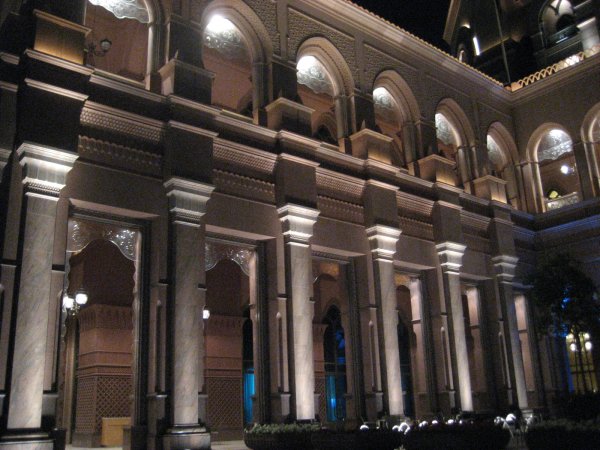
On the other hand, Nationalism seems to be prominent. One of the women who was born in Pakistan and grew up in Saudi Arabia shared several stories of her father's experiences in the racial hierarchy. Apparently, they go for the best performing deal first, but other things being equal, the deal first goes to a fellow Arab, next to an American / European or Japanese, and third to a South Asian nationality.
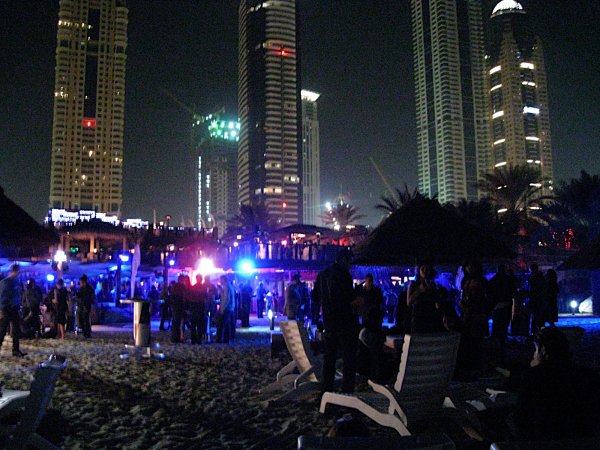
And then New Years at a club on the beach in Dubai. That's tough to beat.

I love the lighting in this picture.
Egypt
Moving on to Egypt....
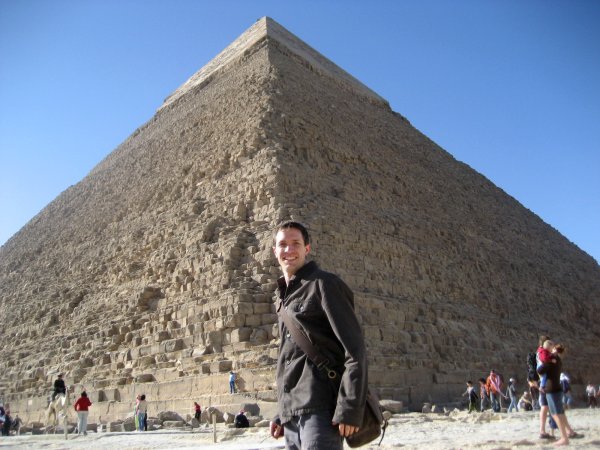
I think I'll write less here, and just post pictures.
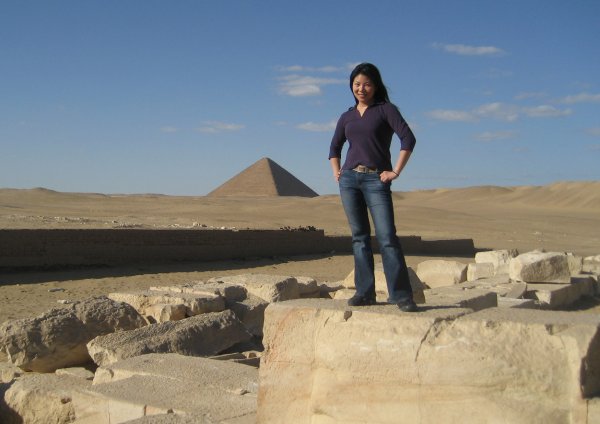 (Red Pyramid in hte background. First straight pyramid built.)
(Red Pyramid in hte background. First straight pyramid built.)
This is my favorite picture from the trip. Ting is the personification of fun and happiness, and it all came otogether in this picture.

After spending six days in Dubai visiting prosperous business leaders, dropping into Egypt strictly as a tourist was quite a different experience. The pyramids and temples were amazing. The city and people though. Cairo = Polluted Air. Dealing Egyptians = Haggle. I hate polluted air, and I hate haggling. I loved everything over 2000 years old, and hated everything less than 2000 years old.
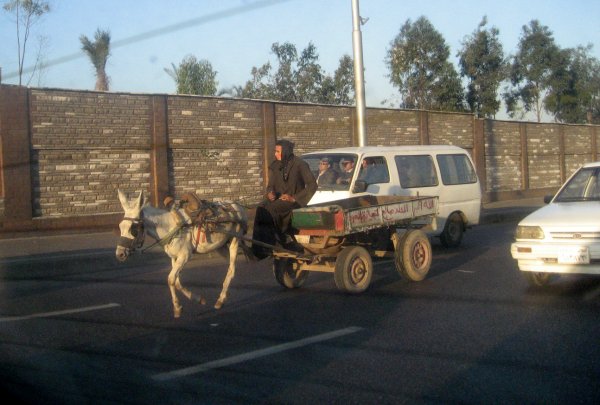
Traffic was a mad house. Anything goes, including donkeys, and driving the wrong way without headlights at midnight.

I must say, I love ingenuity in all its forms. Heavy spring suspension on a scooter is impressive. I just want to see the loads carried on this machine.
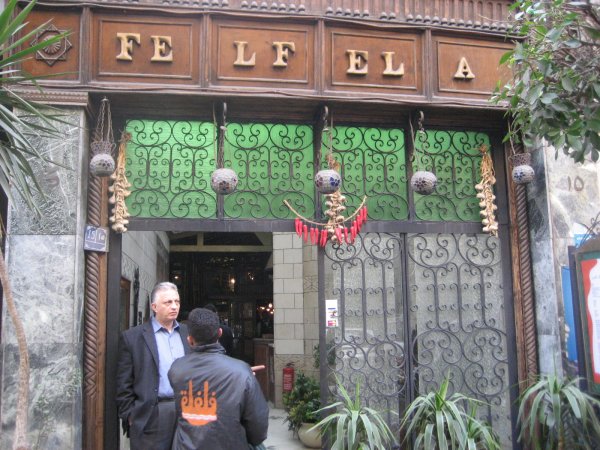
If you go to Cairo, this is a great restaurant downtown somewhere.Felfela Ask a concierge at a hotel, and you should be able to get directions.
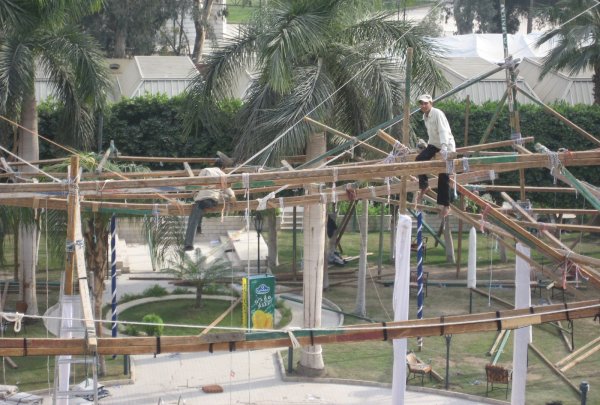
OSHA doesn't live in this country. This structure outside our hotel had been lashed together (with ropes, not screws and bolts) for New Years the night before, and was down by that evening. These guys just swung along from brace to brace, unlashing the thing as they went.
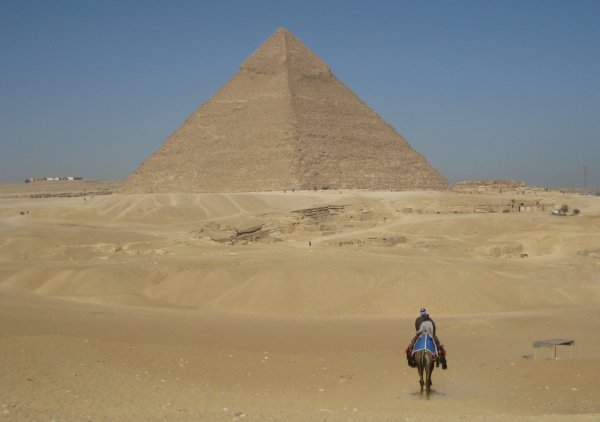
Classic.
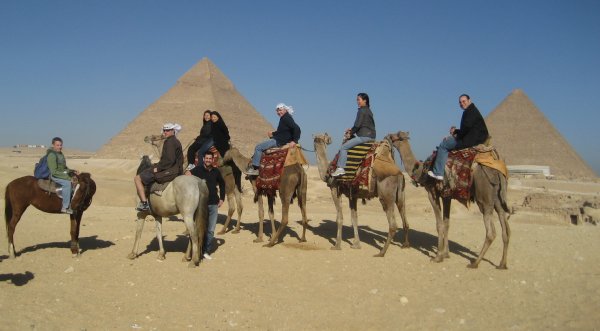
But before we set out to ride camels around the Giza Pyramids, our guide gave us the Egyptian version of a Powerpoint presentation!
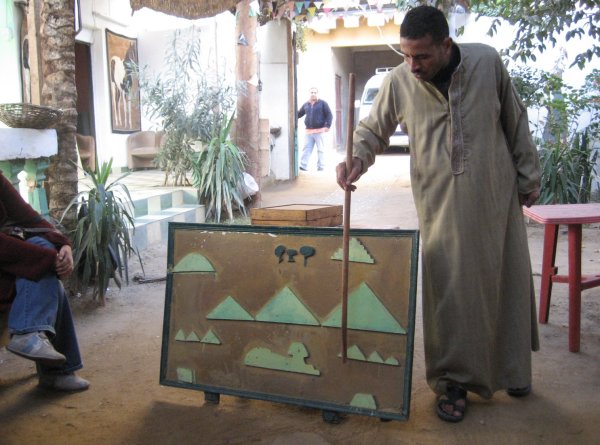
Luxor
The pyramids near Cairo were cool, but the Temples in Luxor were much more interesting.
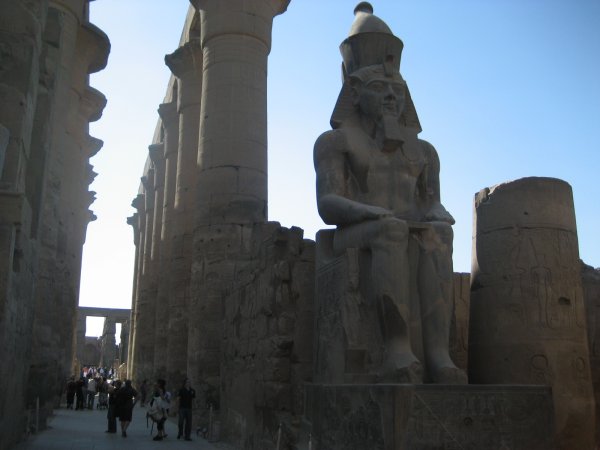
The magnitude of these temples they built is unbelievable.
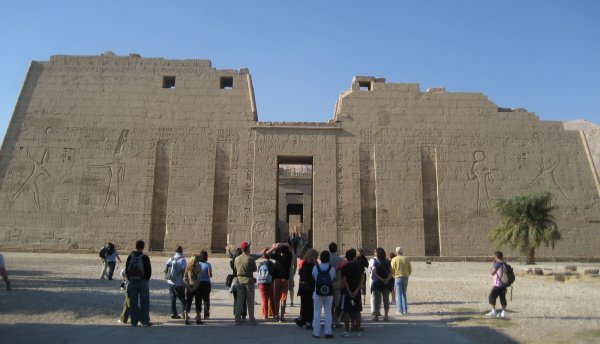
I didn't try to place these pictures in order of which go with which temples, so it's a bit scattered.
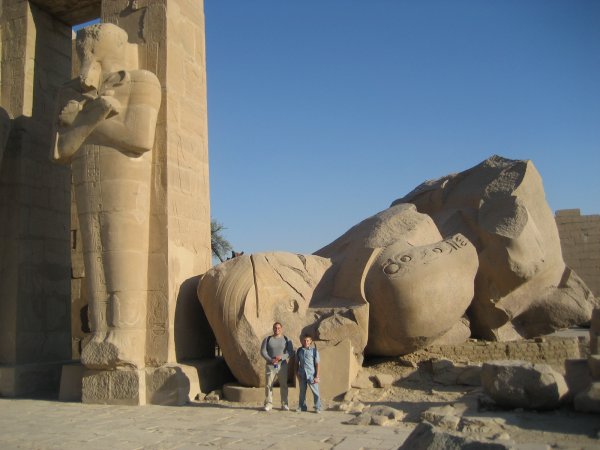
Check out the immensity of this head! The rest of the fallen body is gone.
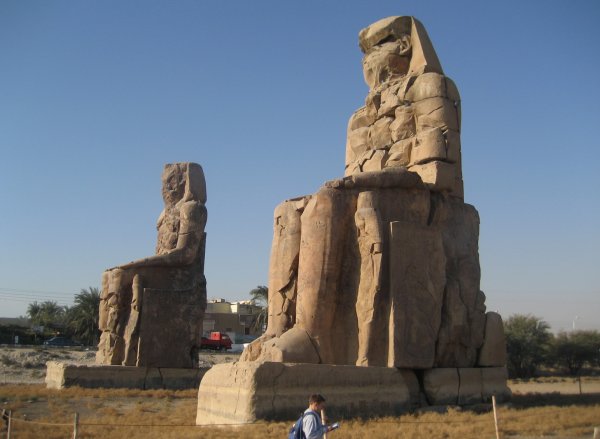
These two huge statues used to make the entrance to the kingdom city. Passing them feels like The Lord of the Rings.
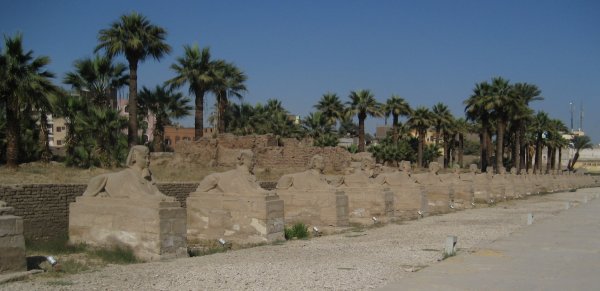
This row of Sphynxes used to stretch 6 km between Luxor Temple and and Karnak temple. With the spacing, I think we estimated it's about 1500 sphynxs, all exactly the same. Ancient Six Sigma.
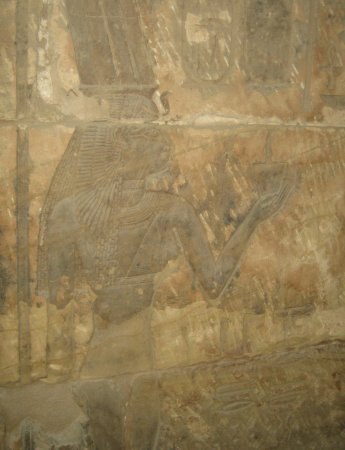
Some of this stuff is so finely carved, it's amazing that 3500 years later, it's still here.
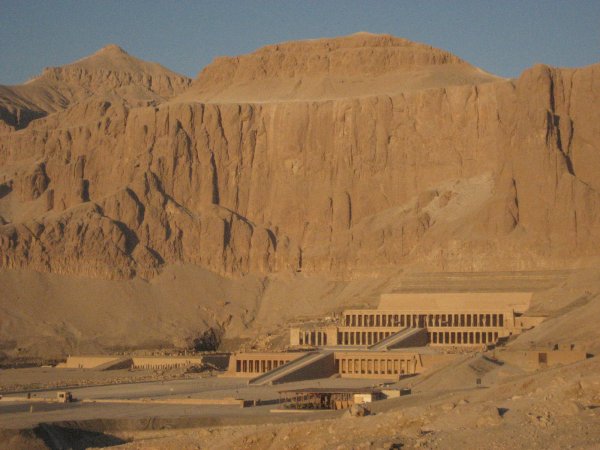
This temple built into the side of this mountain cliff is pretty cool. If you have to miss a temple, this one is the least exciting for walking around. See that peak in the upper left? I shot this picture in the morning, before tourists showed up, while running up to that summit. Great run!
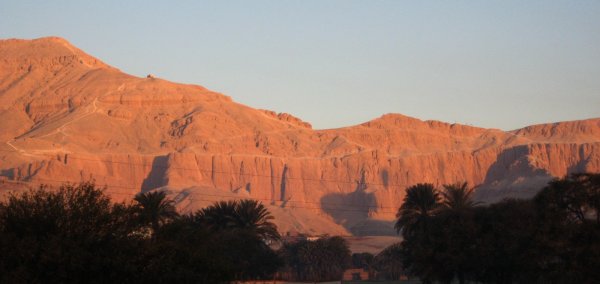
This is the ridge and summit I ran. I ran up the ridgeline, starting further to the right of the picture. From this ridge, you can descend back to the temple, or into the Valley of the Kings. Up the left side you can see a long, long, long staircase to the lower false summit. There's a little boxy shack up top.
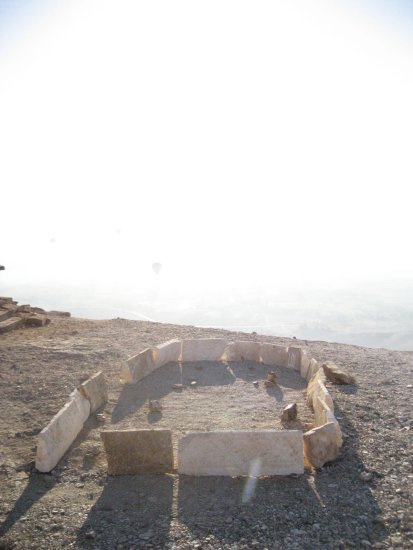
At the top of the long, long staircase, this prayer configuration is laid out, configured straight into the rising sun. While I was running up the ridgeline I took, I saw two guys walking down the stairs. I really think I'd like to practice some sort of religion centrally focused around the sun and the motion of the universe in which we live... to start off each day aligning my worldview and self-image in such harmony with the wholeness of reality.Lifting myself outside of the provincial perspective within which we are so easliy drawn to act and react. Yeah, I'd like that.
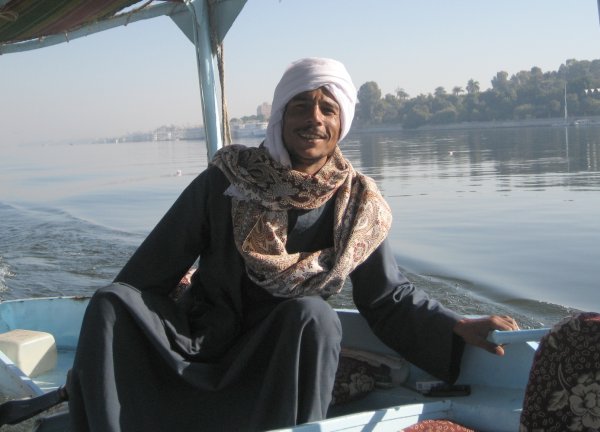
This guy ferried me back across the Nile in time to meet everyone else for the days tourist stops.
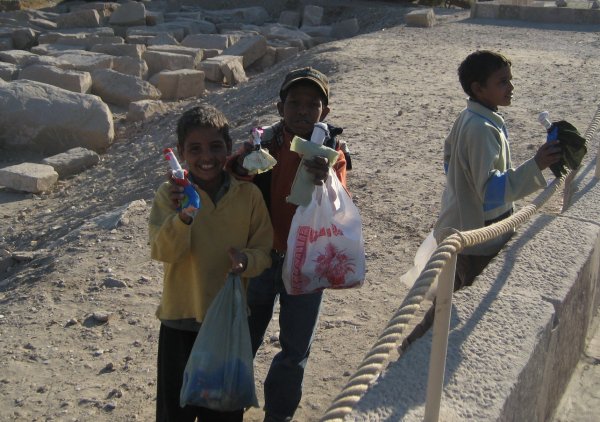
Introducing Achmed and Mohammad. I wish buying their little trinkets could actually do something for the future they're living into. They're happy now, and laughing with each other while out selling to tourists. Chances are they'll grow into a life similar to the live of our cab drivers we hired for the day, Machmud. Maybe they'll end up growing sugar cane (?) like many others around here. I believe they can have a happy life living their lives in Luxor, even if it's far from affluent by standards in developed countries. Chances are they'll live and die, never going far from this town. When I was catching a flight fro Luxor back to Cairo, I saw a family dropping of their older sister (?) at the airport, with the older brother crying like she'd never left before, and wouldn't be coming back.

We all share this world, and experience such different lives, never really knowing what others are experiencing in their lives. I often find myself trying to wrap my mind around this realization. but it's just too vast, and I find myself wandering in the vague realization of the vastness of our different lives.
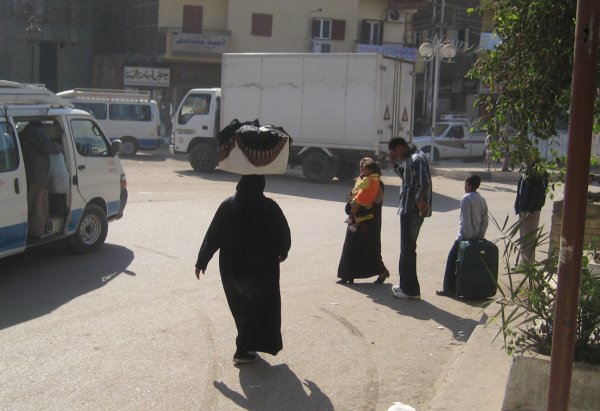
And yet, we're so similar in so many ways, laughing, interacting, working, hoping to continue increasing in our fulfillment of what can be experienced.
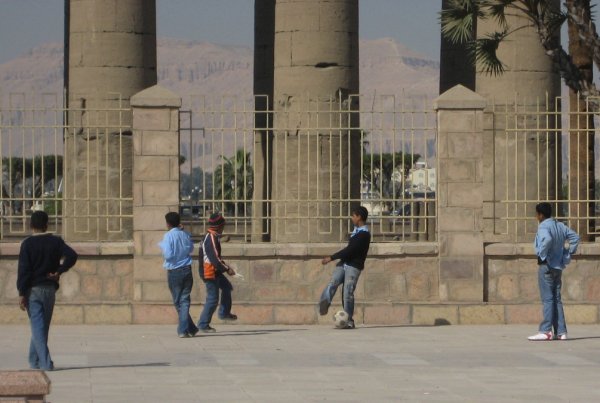
A good game of soccer fits anytime, anywhere.
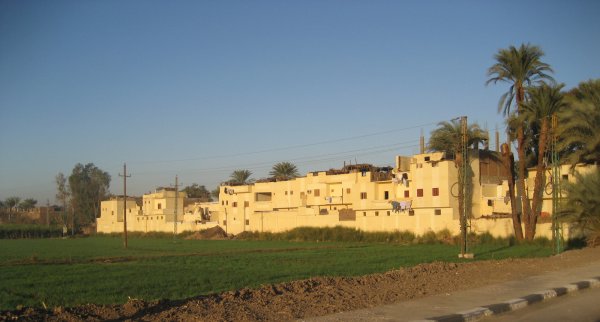
It seems that everyone in Luxor is involved in serving the visiting tourists, or in farming a few local crops. The color in this morning picture was absolutely brilliant... the yellow on the green fields, with the cool damp morning air was just beautiful.
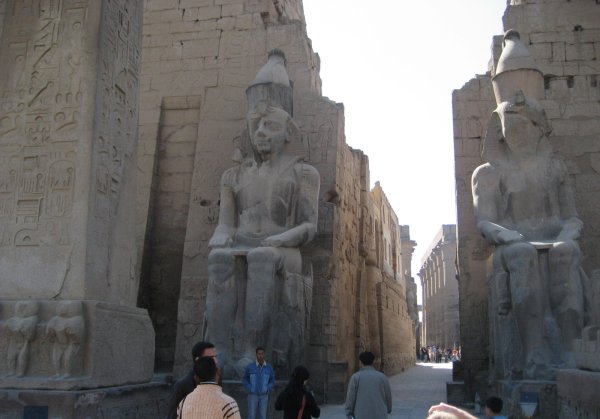
Take a look into the depth down this corridor. These temples stretch so far back into themselves. These things were also buried under loads of dirt for a long time. This in particular has a mosque built a couple stories up, where the ground level used to be.
Reno
After Egypt, I caught a long series of flights back to Reno for AIAA's conference. My presentation for the track on Managing Your Career went well, with about 60 or 70 attending.
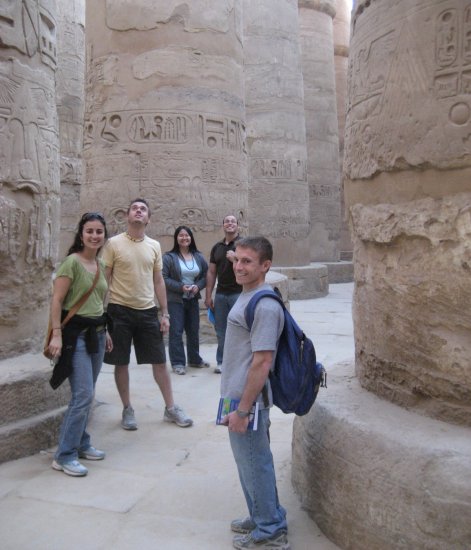
Preparing for the presentation, I sketched up a segment that I really think is significant, and is often overlooked amongst Aerospace Engineers, and easily missed amongst the population generally. As we get involved in the tactical aspects of our lives and our society, I addressed this following issue written here to help bring back a recognition of the greater picture of the country we're living in, and our role in history.
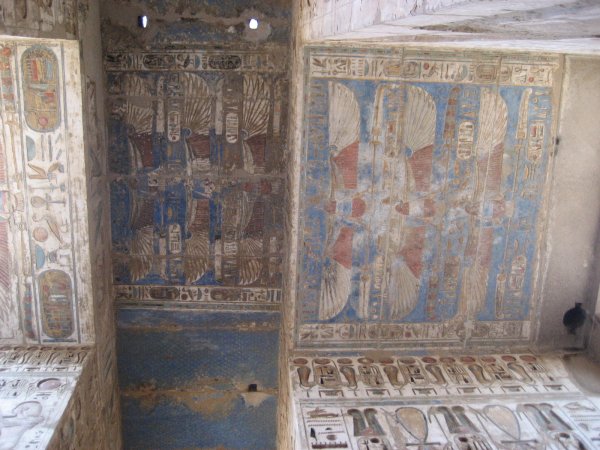 (The color remaining in places is amazing as well. Over 3000 years old)
(The color remaining in places is amazing as well. Over 3000 years old)
A Nation of Great Moral Conscience
What’s additional with Aerospace, is the moral purpose we work toward. Aerospace is about global stability, and expanding humanity beyond this plant. I spent the last six months on a project with Schlumberger, where they design and build directional drilling equipment for oil wells. Cool stuff. It was significant though, comparing it to my time with Northrop Grumman, that what you’re working on is all for earning a profit. Now, earning a profit has moral merit in itself, but in Aerospace we have the additional purpose of empowering the rule of law within our borders, and defending this form of society that has been built over the centuries before us.
We are living in the greatest country, with the greatest opportunity, that anybody has ever seen throughout history. The Egyptians built a great civilization, as did the Romans, and others. However, nobody has ever built a society as prosperous, asstrong, and as compassionate as the society we have today in America.
Be that as it may, there are people in the world who are actively seeking to destroythis great country we live in. Whatever their personal complaints about America may be, their objective is destruction, not diplomatic compromise. And if we don’t defend ourselves against them, they’ll destroy the greatest civilization that has ever grown up on this planet. In Aerospace, we are working with the moral purpose of defending this civilization.
What’s more, we are working in a country that has a strong collective moral conscience. While the invasion of Iraq may or may not have been morally correct, the fact that our country so strongly debates our actions there is the mark of a great moral conscience within the people of this country. We may not always make the right moves, but we always strive to make the right moves.
As citizens of this country, we always insist that our power is used for the global good of humanity. That is the mark of a great nation. And that is the nation our work in Aerospace is intent on defending.
We need to remember this as we work in this industry. The systems we engineer are under the control of a country with a great moral conscience, always doing our best to put them to use that is morally correct. We may not always succeed in morally correct action, but we always, always strive for it.
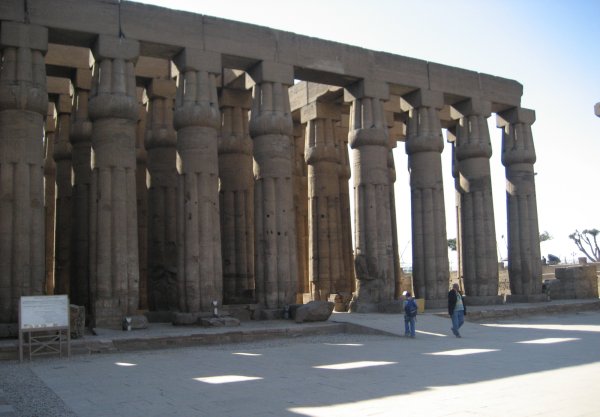
The overlap of civilizations throughout history is always interesting. History moves on a time scale so vast compared to our individual lives, and yet history is written directly by the decision and lives of individuals living in the moment of their own lives.
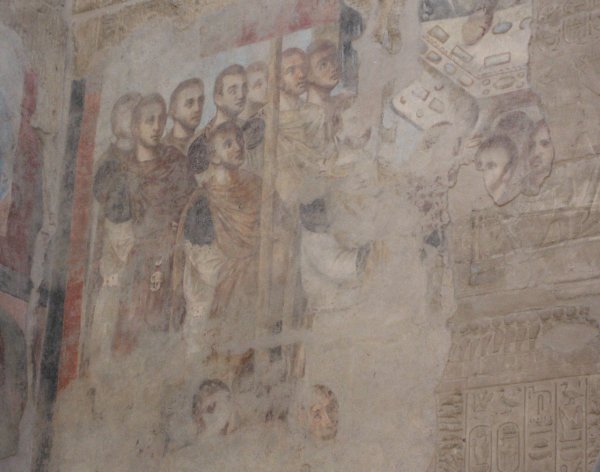
The color in the relief here is from when the Romans controlled this temple over 1500 years ago. They didn't destroy the Egyptian glyphs underneath, but just plastered over them and made their own paintings.

With all the vibrant colors, these temples looked vastly different than what we see today. So much changes, and it takes attention to the subtleties and details, coupled with imagination to see what may have been the experience by those living and creating these things.
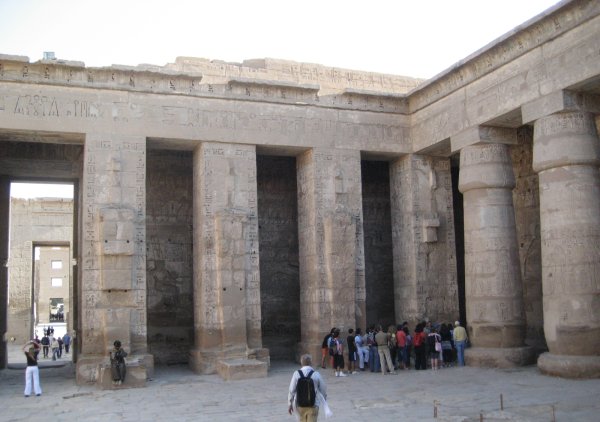
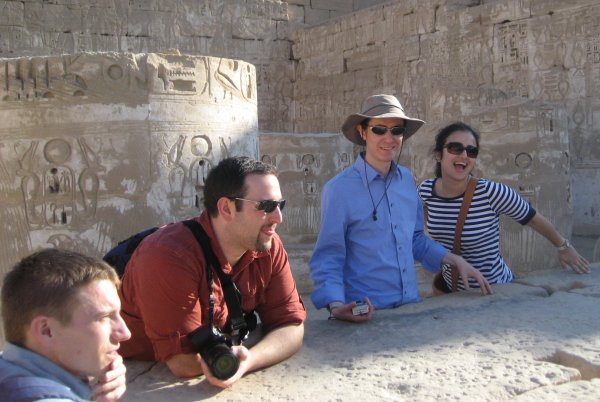
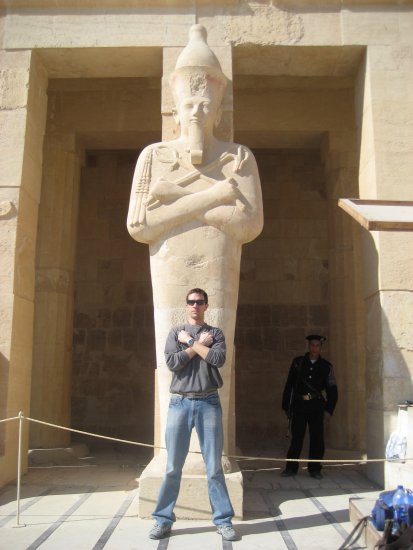
And then our trip was all over and we had to go home...
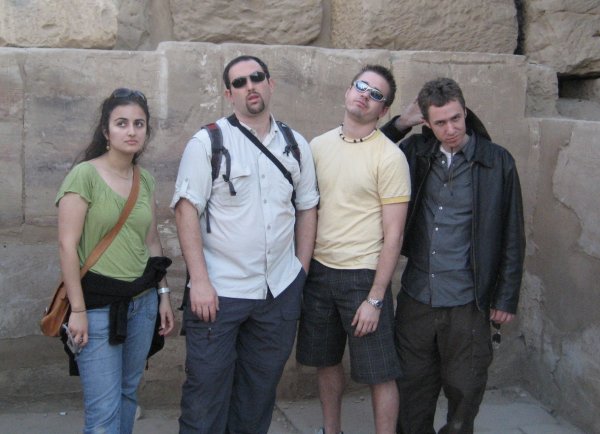
Los Angeles
After Reno, I dropped into LA to visit a couple Northrop Grumman sites, exploring options for my reentry after graduation. I must say, it felt good to be back in LA again.
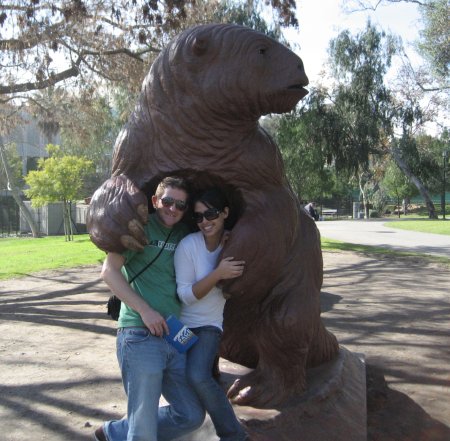
Boston
After another stop in Colorado, I finally made it back to Boston, and then realized I had nothing but hardwood floor to sleep on for a couple nights until the warehouse opened and I could move out some stuff to sleep on. So I spread out my clothes, which made a better bed than I expected.

Primaries
Following these Primaries has been very interesting. I normally make it a point to avoid politics, but I'm making an exception for this post. It's been a roller coaster watching the Democrats initially appear stable and decided, with the Republican race wide open. Then watching Obama accelerate into a dog fight with Hillary, as the Republicans duked it out to an apparent front runner. And then as soon as McCain's front runner status was assured, we have a symbolic blow to the strength of that post. And as the Democrats wonder if Obama can keep his momentum, the Super Delegates are now being brought in to make a difference as they choose. Everything is always switching from expectations!
As for my position, I used to think of myself as an Independent, but looking at the positions of both parties coming into this election, I'm a bit surprised how much my top perceived priorities align with the Republican party. I think I most closely fit the category of Libertarian Republican, but I depart from that classification markedly as well.
Concerning the candidates, I was initially skeptical of Romney, but the more I searched into his life and his positions, including the nature of his "flip-flops" (2 of the 3 which have been misrepresented and exaggerated), I came through as a strong Romney supporter. For a while, if Romney dropped out I was thinking I'd like Obama to take the White House, even if I disagree with some of his policies. I believe he's a good honest person, smart and capable, and I think he has the attitude America needs at this time. Looking deeper into his positions though, even though I like his personality, I think he'll take us in a poor direction. So now, even though I don't like some things about McCain, I expect I'll vote for him.
First of all, we need fiscal discipline back in Washington, especially after these years of soaring deficits, and with the outlook of growing entitlements. Republican or Democrat, cutting spending or raising taxes (probably some of both when the economy rebounds), we need fiscal responsibility to return. Romney and McCain would both be strong on this.
Our Health Care system in this nation has problems, and we need to address them. Namely, it's too expensive for what we get. The answer though, isn't to just get the government to pick up the bill and promise to magically make health care cost less (that just means we still pay the exorbitant cost, but pay an additional govt. middle man to pay it for us). We need to address the phenomena of Adverse Selection, not through a single universal buyer, but through a system like Romney implemented in MA which eliminates Adverse Selection. In addition, we need to address the legal liabilities involved which ratchet up every expense, regardless if insurance or govt. is paying. After that, as much as I oppose socialized health care, I do believe it's appropriate for the government to cover a certain category of people who can't afford health care. I believe a well designed form of Welfare (like Giuliani's "Workfare") is good for social stability, and the same holds for Health Care coverage. We need appropriate market and legal mechanisms to let the market drive down the cost of the basic care we need. not just tax enough to feed an already broken system, hoping the government can make it more efficient (when did the govt last make something more efficient?).
On illegal immigration, it's not about isolationism and keeping Mexicans out of our country. I misunderstood this issue before I studied it, so I sympathize when I discover this issue to be misunderstood by many of my Democrat friends (and even some anti-illegal-immigration Republicans). It really is focused on what is best and compassionate for the working class of both America and Mexico. Stopping illegal immigration is about reducing crime in America, maintaining living standards for the lower and middle class, reducing the burden on our nations Health Care, enabling sustainable economic development in Mexico, avoiding social discontent in America, sustaining public education, and national security.
We absolutely need to secure the border. We need to stop the flow of illegals, so we can reward the law abiding immigrants (as opposed to law breaking immigrants) and control who comes. Once that is taken care of, I could swallow the McCain-Kennedy plan for amnesty to those who have been working here for over five years. Not optimal, but workable, IF the border is secured FIRST. On the other extreme, giving away Drivers Licenses to the illegals will only introduce all sorts of problems (not to mention voting problems), and invite a faster flood of illegals. We need to encourage adherence to legal participation in America, and doing so will allow us to more effectively assist more willing immigrants, and effectively help Mexico develop their economy.
On Iraq, whether it was right to go in or not (and whether who voted for or against it), we're in there now. We have a moral obligation to the Iraqi people to stay there long enough, and invest the resources necessary to complete the hand over of a stabilized country. Al Qaeda and American security aside, it would be utterly inhumane and irresponsible for us to abandon this country before sufficiently helping them stabilize under a secure government. And they're making strong progress. In 2007, there were more violent deaths in similar population Venezuela than in Iraq. As for death tolls, four times as many Americans die each year from drunk driving than have died over 4+ years in Iraq. (US population = 11x Iraq pop.) We need perspective on this. Maybe it was immoral to enter Iraq, and every death is a loss we want to avoid, but it is absolutely immoral, and short sighted to make a hasty runaway now.
Fiction
But enough on controversial issues. How about some fiction? I was sorting my old journal entries into folders, and ran across this note from reading Tolkien's Silmarillion. I don't recall if it's a direct quote, or a recognition derived from the book, but I like it:
"The light of Valinor (derived from light before any fall) is the light of art undivorced from reason, that sees things both scientifically (or philosophically) and imaginatively (or sub-creatively) and 'says that they are good' - as beautiful."
Fiction is great for planting yourself in a perspective from which to view reality in alternative and beautiful ways. While in England, I listened to Orson Scott Card’s Ender’s Game and Speaker For The Dead. Great stories. Lately I’ve been listening to Alan Greenspan’s Age of Turbulence. One of the best books I’ve read since The World is Flat. (btw… A Woman In Charge by Carl Bernstein is nothing but “Praise Hillary, Blame Bill.” If you want to learn about Hillary, I suggest another book). I think I need to start into some fiction again. It’s good for the soul.
Necessity vs. Luxury
One of my favorite lines from Greenspan, talking about India:
"Cell phone coverage is wide and inexpensive. It was deemed a luxury, and therefore left to the market. Basic electricity is unreliable and expensive. It was deemed a necessity, and could only be trusted to the government."
These kind of paradoxes make me laugh. until I see large groups of people in America who still don't seem to have learned the lesson, taught over and over again, and believe the government can better control "necessities" like Health Care and Alt Energy development. "Guarantees" from the government have never been delivered as well as the politicians promise. and yet people are still willing to believe them. People need to spend more time entertained by history and economics, and less time entertained by promising politicians.